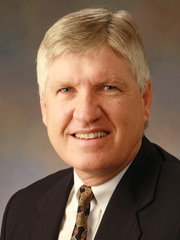Stephen P. Sugrue, Ph.D.
Professor and Chair of Anatomy and Cell Biology
College of Medicine
2007 Awardee
 Throughout his independent career, Stephen Sugrue’s research interests have been in the area of epithelial cell biology. His research has focused on fundamental and important questions to explain how epithelial cells remain epithelial. Over the years, he has applied multiple cutting-edge approaches to explore the fundamental molecular mechanisms that control epithelial cell-cell adhesion.
Throughout his independent career, Stephen Sugrue’s research interests have been in the area of epithelial cell biology. His research has focused on fundamental and important questions to explain how epithelial cells remain epithelial. Over the years, he has applied multiple cutting-edge approaches to explore the fundamental molecular mechanisms that control epithelial cell-cell adhesion. Sugrue recently discovered a protein, pinin (Pnn), which is integral to controlling the epi-thelial genetic program.
“Recent data pertaining to Pnn has taken us in a significantly new and exciting direction toward the exploration of the involvement of Pnn in the linkage of transcriptional repression and mRNA processing,” Sugrue says. “We wish to examine the mechanism by which Pnn affects downstream gene expression pertaining to epithelial adhesion through its specific association with transcriptional repressors via its binding to the co-repressor CtBP.”
The data to be derived from this and other related studies will contribute to researchers’ ability to modify the adhesive capacity of epithelial cells and come closer to reversing the phenotypes of adhesion-related diseases. Sugrue’s earlier studies indicated that Pnn functions as an epithelial tumor suppressor; the Pnn gene is frequently found inactivated in transitional cell carcinoma, renal cell carcinoma and a variety of other epithelial cell tumors.
“It is our hope to extend our observations on the mechanism of Pnn’s action to the identification of a key regulatory step in the loss of epithelial adhesion that occurs in carcinoma progression,” he says.
Sugrue has maintained uninterrupted NIH R01 funding since 1983. Currently, he directs a $1.25 million NIH project on epithelial adhesion interactions in the cornea, and is a co-investigator on UF’s NIH-funded Vision Research Center. This past year he won a State of Florida Bankhead-Coley Shared Instrumentation Grant that will fund a much-needed confocal microscope for the UF Shands Cancer Center.

